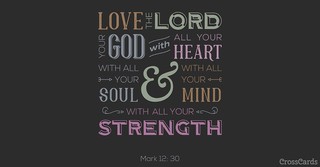
- Recent Translations
- All Translations
Mark 12:28
Share
Settings
Mark 12:28 Meaning and Commentary
And one of the Scribes came
Matthew calls him a lawyer, ( Matthew 22:35 ) , an interpreter of the law, as a Scribe was:
and having heard them reasoning together;
being present at the dispute between Christ and the Sadducees, which he diligently attended to:
and perceiving that he had answered them well:
in a most beautiful manner. The Jews have adopted the very Greek word here used, and make use of it in the same sense as (Mwlaq hyl rma) F14, "he answered him well": or, as the gloss upon it, "praise worthily"; in a manner deserving praise; and is the same with (trmaq rypv) F15, "thou hast said well", or beautifully; and so the answer here was with great solidity, and judgment, and strength of argument, to their utter confusion and silence; whereby he understood he had considerable knowledge in the law, and yet was willing to try if he could not puzzle him with a question relating to it:
asked him, which is the first commandment of all?
of all the commandments in the law, moral and ceremonial.
F14 T. Bab. Sabbat, fol. 108. 1.
F15 Zohar in Lev. fol. 2. 3. & 15. 1.

